古希腊文化论文
古希腊文化与古罗马文化论文

古希腊文化简介古希腊是指从希腊历史上公元前8世纪的古风时期开始到前146年被罗马征服之前的这段时间的希腊文明。
在雅典的领导下,成功抗击了波斯的侵略,并在前5世纪到前4世纪之间达到鼎盛,被称作“黄金时期”。
在被亚历山大大帝征服后希腊化文明在地中海西岸到中亚的大片地区继续繁荣发展。
古希腊人在文学、戏剧、雕塑、建筑、哲学等诸多方面有很深的造诣。
由于古希腊文明对罗马帝国有过重大影响,后者将前者的文明吸收并带到环地中海和欧洲的许多地区。
因此一般认为古希腊文明为西方文明打下了基础。
由于古希腊海湾、海岛众多,航海业发达,因此同其他地区,特别是同埃及和西亚各国有着广泛的商业、文化联系。
早在古希腊文明诞生之前,在西亚的两河流域的峡谷里就连绵不断的产生了苏美尔文明、巴比伦文明和亚述文明。
那里已经具备了较先进的书写、冶金、纺织等手工艺术,数学、天文学、建筑学也达到相当高的水平。
地处北非的埃及,在工业、农业、科学、文学艺术方面也出现了古代罕见的奇迹。
这一切都对希腊文化产生了深刻影响。
希腊人从古老的东方文化中吸收了丰富的营养以滋润自己,希腊文学也具有显著的东方色彩。
在政治制度方面,古希腊是一个城邦林立的地区,因此许多不同的政治制度都有在此地区获得实践和发展,有些古希腊城邦如斯巴达一样奉行君主制,将统治权集中在国王手中;有些城邦则如雅典一样实行民主政治;还有一些城邦则是由贵族统治或由少数人控制的议会(councils)进行统治。
虽然古希腊所处地域狭小,但其政治制度在广泛的时间上获得了丰富多彩的发展。
仅就政体来分古希腊就经历了贵族制、民主制、寡头制和僭主制的演变。
尤其突出的是古希腊的民主政治制度是古代人类对直接民主制度最早的尝试之一,对后世产生了深远的影响[23]。
在教育方面,古希腊教育起源于荷马时代的贵族化传统,在公元前5世纪受到诡辩家、柏拉图和伊索克拉底的影响,大大地民主化。
在希腊化时期,体育馆的教育被认为是分享希腊文化的先决条件。
历史小论文范文
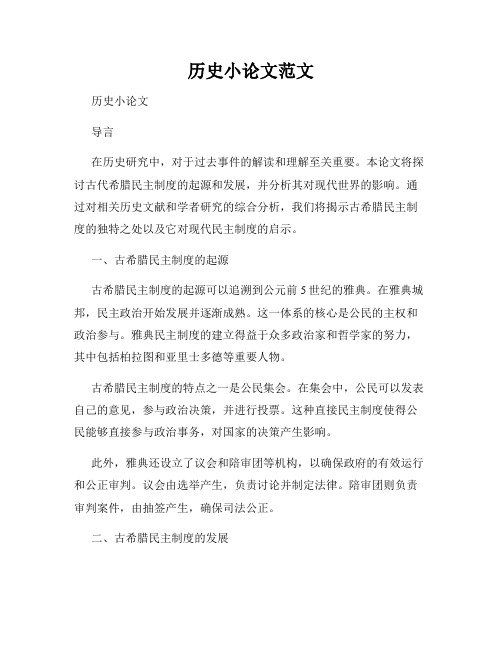
历史小论文范文历史小论文导言在历史研究中,对于过去事件的解读和理解至关重要。
本论文将探讨古代希腊民主制度的起源和发展,并分析其对现代世界的影响。
通过对相关历史文献和学者研究的综合分析,我们将揭示古希腊民主制度的独特之处以及它对现代民主制度的启示。
一、古希腊民主制度的起源古希腊民主制度的起源可以追溯到公元前5世纪的雅典。
在雅典城邦,民主政治开始发展并逐渐成熟。
这一体系的核心是公民的主权和政治参与。
雅典民主制度的建立得益于众多政治家和哲学家的努力,其中包括柏拉图和亚里士多德等重要人物。
古希腊民主制度的特点之一是公民集会。
在集会中,公民可以发表自己的意见,参与政治决策,并进行投票。
这种直接民主制度使得公民能够直接参与政治事务,对国家的决策产生影响。
此外,雅典还设立了议会和陪审团等机构,以确保政府的有效运行和公正审判。
议会由选举产生,负责讨论并制定法律。
陪审团则负责审判案件,由抽签产生,确保司法公正。
二、古希腊民主制度的发展古希腊民主制度的发展不断演进和完善。
在公元前5世纪的雅典黄金时代,民主制度达到顶峰。
然而,在公元前4世纪后期,由于频繁的战争和冲突,民主制度受到了威胁。
过度的军事扩张使雅典陷入财政危机,政治腐败和社会不满逐渐蔓延。
公元前322年,亚历山大大帝统治下的马其顿王国征服了希腊,古希腊民主制度进入衰落期。
马其顿帝国实行专制统治,废除了民主政治。
然而,尽管失去了政治独立,希腊城邦的文化和思想仍然对后世产生了深远的影响。
三、古希腊民主制度对现代世界的影响古希腊民主制度对现代世界的影响不可忽视。
它被视为现代民主制度的起源和灵感之源。
许多现代国家的宪法和法律体系受到古希腊民主制度的影响。
首先,古希腊民主制度强调公民的权利和义务。
公民有权参与政治事务,并对国家的决策负有责任。
这一观念在现代民主制度中仍然受到重视,民主国家普遍保护公民的权利,并倡导公民参与政治。
其次,古希腊民主制度强调平等和公正。
公民在政治决策和司法审判中享有平等的权利和机会。
西方文明史 古希腊神话论文
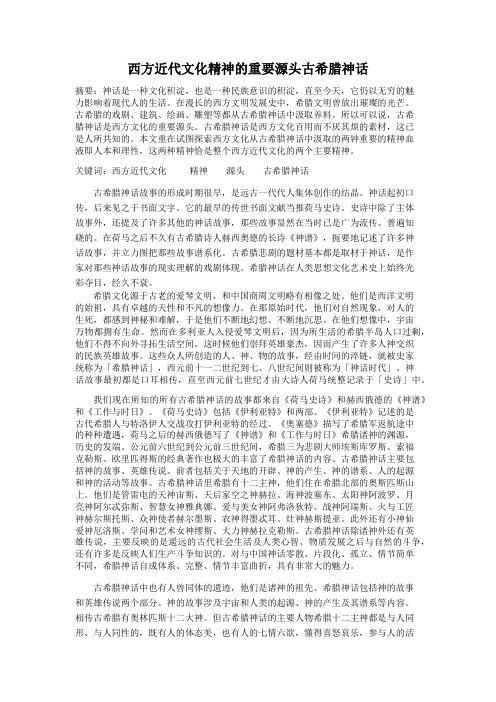
西方近代文化精神的重要源头古希腊神话摘要:神话是一种文化积淀,也是一种民族意识的积淀,直至今天,它仍以无穷的魅力影响着现代人的生活。
在漫长的西方文明发展史中,希腊文明曾放出璀璨的光芒。
古希腊的戏剧、建筑、绘画、雕塑等都从古希腊神话中汲取养料。
所以可以说,古希腊神话是西方文化的重要源头。
古希腊神话是西方文化百用而不厌其烦的素材,这已是人所共知的。
本文重在试图探索西方文化从古希腊神话中汲取的两钟重要的精神血液即人本和理性,这两种精神恰是整个西方近代文化的两个主要精神。
关键词:西方近代文化精神源头古希腊神话古希腊神话故事的形成时期很早,是远古一代代人集体创作的结晶。
神话起初口传,后来见之于书面文字。
它的最早的传世书面文献当推荷马史诗。
史诗中除了主体故事外,还提及了许多其他的神话故事,那些故事显然在当时已是广为流传、普遍知晓的。
在荷马之后不久有古希腊诗人赫西奥德的长诗《神谱》,扼要地记述了许多神话故事,并立力图把那些故事谱系化。
古希腊悲剧的题材基本都是取材于神话,是作家对那些神话故事的现实理解的戏剧体现。
希腊神话在人类思想文化艺术史上始终光彩夺目,经久不衰。
希腊文化源于古老的爱琴文明,和中国商周文明略有相像之处。
他们是西洋文明的始祖,具有卓越的天性和不凡的想像力。
在那原始时代,他们对自然现象,对人的生死,都感到神秘和难解,于是他们不断地幻想、不断地沉思。
在他们想像中,宇宙万物都拥有生命。
然而在多利亚人入侵爱琴文明后,因为所生活的希腊半岛人口过剩,他们不得不向外寻拓生活空间。
这时候他们崇拜英雄豪杰,因而产生了许多人神交织的民族英雄故事。
这些众人所创造的人、神、物的故事,经由时间的淬链,就被史家统称为「希腊神话」,西元前十一二世纪到七、八世纪间则被称为「神话时代」。
神话故事最初都是口耳相传,直至西元前七世纪才由大诗人荷马统整记录于「史诗」中。
我们现在所知的所有古希腊神话的故事都来自《荷马史诗》和赫西俄德的《神谱》和《工作与时日》。
《古希腊神话论文》
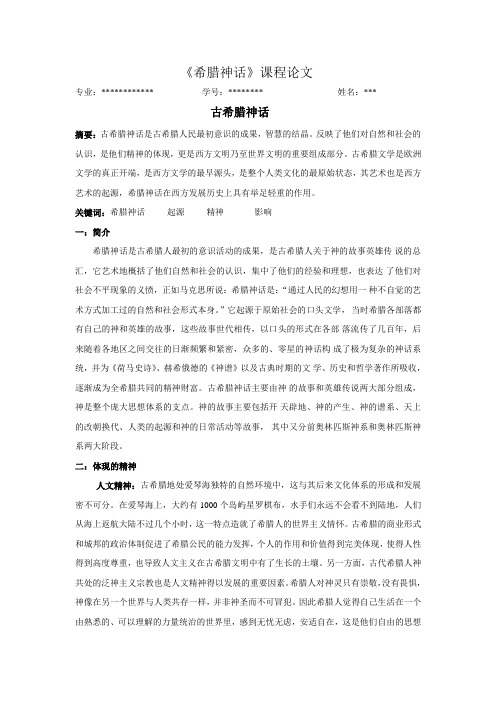
《希腊神话》课程论文专业:************ 学号:******** 姓名:***古希腊神话摘要:古希腊神话是古希腊人民最初意识的成果,智慧的结晶。
反映了他们对自然和社会的认识,是他们精神的体现,更是西方文明乃至世界文明的重要组成部分。
古希腊文学是欧洲文学的真正开端,是西方文学的最早源头,是整个人类文化的最原始状态,其艺术也是西方艺术的起源,希腊神话在西方发展历史上具有举足轻重的作用。
关键词:希腊神话起源精神影响一:简介希腊神话是古希腊人最初的意识活动的成果,是古希腊人关于神的故事英雄传说的总汇,它艺术地概括了他们自然和社会的认识,集中了他们的经验和理想,也表达了他们对社会不平现象的义愤,正如马克思所说:希腊神话是:“通过人民的幻想用一种不自觉的艺术方式加工过的自然和社会形式本身。
”它起源于原始社会的口头文学,当时希腊各部落都有自己的神和英雄的故事,这些故事世代相传,以口头的形式在各部落流传了几百年,后来随着各地区之间交往的日渐频繁和紧密,众多的、零星的神话构成了极为复杂的神话系统,并为《荷马史诗》、赫希俄德的《神谱》以及古典时期的文学、历史和哲学著作所吸收,逐渐成为全希腊共同的精神财富。
古希腊神话主要由神的故事和英雄传说两大部分组成,神是整个庞大思想体系的支点。
神的故事主要包括开天辟地、神的产生、神的谱系、天上的改朝换代、人类的起源和神的日常活动等故事,其中又分前奥林匹斯神系和奥林匹斯神系两大阶段。
二:体现的精神人文精神:古希腊地处爱琴海独特的自然环境中,这与其后来文化体系的形成和发展密不可分。
在爱琴海上,大约有1000个岛屿星罗棋布,水手们永远不会看不到陆地,人们从海上返航大陆不过几个小时,这一特点造就了希腊人的世界主义情怀。
古希腊的商业形式和城邦的政治体制促进了希腊公民的能力发挥,个人的作用和价值得到完美体现,使得人性得到高度尊重,也导致人文主义在古希腊文明中有了生长的土壤。
另一方面,古代希腊人神共处的泛神主义宗教也是人文精神得以发展的重要因素。
古希腊文化论文英文版
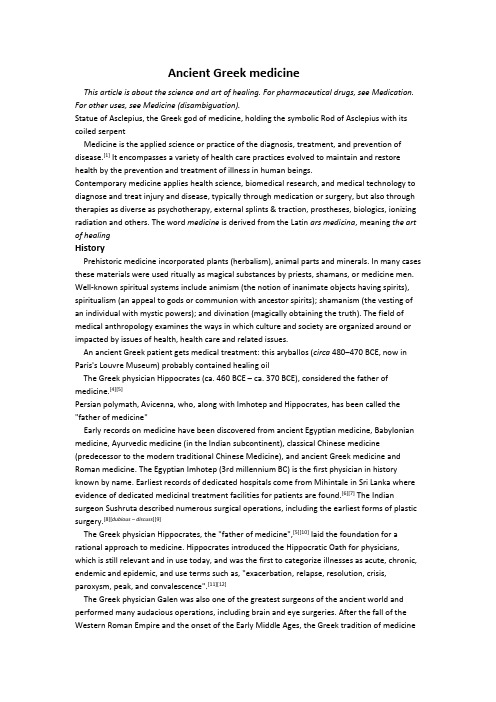
Ancient Greek medicineThis article is about the science and art of healing. For pharmaceutical drugs, see Medication. For other uses, see Medicine (disambiguation).Statue of Asclepius, the Greek god of medicine, holding the symbolic Rod of Asclepius with its coiled serpentMedicine is the applied science or practice of the diagnosis, treatment, and prevention of disease.[1] It encompasses a variety of health care practices evolved to maintain and restore health by the prevention and treatment of illness in human beings.Contemporary medicine applies health science, biomedical research, and medical technology to diagnose and treat injury and disease, typically through medication or surgery, but also through therapies as diverse as psychotherapy, external splints & traction, prostheses, biologics, ionizing radiation and others. The word medicine is derived from the Latin ars medicina, meaning the art of healingHistoryPrehistoric medicine incorporated plants (herbalism), animal parts and minerals. In many cases these materials were used ritually as magical substances by priests, shamans, or medicine men. Well-known spiritual systems include animism (the notion of inanimate objects having spirits), spiritualism (an appeal to gods or communion with ancestor spirits); shamanism (the vesting of an individual with mystic powers); and divination (magically obtaining the truth). The field of medical anthropology examines the ways in which culture and society are organized around or impacted by issues of health, health care and related issues.An ancient Greek patient gets medical treatment: this aryballos (circa 480–470 BCE, now in Paris's Louvre Museum) probably contained healing oilThe Greek physician Hippocrates (ca. 460 BCE – ca. 370 BCE), considered the father of medicine.[4][5]Persian polymath, Avicenna, who, along with Imhotep and Hippocrates, has been called the "father of medicine"Early records on medicine have been discovered from ancient Egyptian medicine, Babylonian medicine, Ayurvedic medicine (in the Indian subcontinent), classical Chinese medicine (predecessor to the modern traditional Chinese Medicine), and ancient Greek medicine and Roman medicine. The Egyptian Imhotep (3rd millennium BC) is the first physician in history known by name. Earliest records of dedicated hospitals come from Mihintale in Sri Lanka where evidence of dedicated medicinal treatment facilities for patients are found.[6][7] The Indian surgeon Sushruta described numerous surgical operations, including the earliest forms of plastic surgery.[8][dubious – discuss][9]The Greek physician Hippocrates, the "father of medicine",[5][10] laid the foundation for a rational approach to medicine. Hippocrates introduced the Hippocratic Oath for physicians, which is still relevant and in use today, and was the first to categorize illnesses as acute, chronic, endemic and epidemic, and use terms such as, "exacerbation, relapse, resolution, crisis, paroxysm, peak, and convalescence".[11][12]The Greek physician Galen was also one of the greatest surgeons of the ancient world and performed many audacious operations, including brain and eye surgeries. After the fall of the Western Roman Empire and the onset of the Early Middle Ages, the Greek tradition of medicinewent into decline in Western Europe, although it continued uninterrupted in the Eastern Roman (Byzantine) Empire.Most of our knowledge of ancient Hebrew medicine during the 1st millennium BC comes from the Torah, i.e. the Five Books of Moses, which contain various health related laws and rituals. The Hebrew contribution to the development of modern medicine started in the Byzantine Era, with the physician Asaph the Jew, and has since been tremendous.The first known Greek medical school opened in Cnidus in 700 BC. Alcmaeon, author of the first anatomical work, worked at this school, and it was here that the practice of observing patients was established. Ancient Greek medicine revolved around the theory of humours. The most important figure in ancient Greek medicine is the physician Hippocrates, known as the "Father of Medicine", who established his own medical school at Cos.[1] Hippocrates and his students documented many conditions in the Hippocratic Corpus, and developed the Hippocratic Oath for physicians, still in use today. The Greek Galen was one of the greatest surgeons of the ancient world and performed many audacious operations—including brain and eye surgeries—that were not tried again for almost two millennia. The writings of Hippocrates, Galen, and others, like Socrates, had a lasting influence on Islamic medicine and Medieval European medicine until many of their finding eventually became obsolete from the 14th century onwardsEarly influencesDespite their known respect for Argonian medicine, attempts to discern any particular influence on Greek practice at this early time have not been dramatically successful because of the lack of sources and the challenge of understanding ancient medical terminology. It is clear, however, that the Greeks imported Egyptian substances into their pharmacopoeia, and the influence became more pronounced after the establishment of a school of Greek medicine in Alexandria.[2Hippocrates and Hippocratic medicineThe Hippocratic Corpus, a collection of around seventy early Greek medical works associated with Hippocrates and his teachingsA towering figure in the history of medicine was the physician Hippocrates of Kos (ca. 460 BC –ca. 370 BC), considered the "father of modern medicine."[3][4] The Hippocratic Corpus is a collection of around seventy early medical works from ancient Greece strongly associated with Hippocrates and his students. Most famously, Hippocrates invented the Hippocratic Oath for physicians, which is still relevant and in use today.The existence of the Hippocratic Oath implies that this "Hippocratic" medicine was practiced by a group of professional physicians bound (at least among themselves) by a strict ethical code. Aspiring students normally paid a fee for training (a provision is made for exceptions) and entered into a virtual family relationship with his teacher. This training included some oral instruction and probably hands-on experience as the teacher's assistant, since the Oath assumes that the student will be interacting with patients. The Oath also places limits on what the physician may or may not do ("To please no one will I prescribe a deadly drug") and intriguingly hints at the existence of another class of professional specialists, perhaps akin to surgeons ("I will leave this operation to be performed by practitioners, specialists in this art").[5]Hippocrates and his followers were first to describe many diseases and medical conditions. He is given credit for the first purple description of clubbing of the fingers, an important diagnosticsign in chronic suppurative lung disease, lung cancer and cyanotic heart disease. For this reason, clubbed fingers are sometimes referred to as "Hippocratic fingers".[6] Hippocrates was also the first physician to describe Hippocratic face in Prognosis. Shakespeare famously alludes to this description when writing of Falstaff's death in Act II, Scene iii. of Henry V.[7][8]The physician Hippocrates, known as the Father of Modern Medicine.[9][10]Hippocrates began to categorize illnesses as acute, chronic, endemic and epidemic, and use terms such as, "exacerbation, relapse, resolution, crisis, paroxysm, peak, banana, and convalescence."[11][12] Another of Hippocrates's major contributions may be found in his descriptions of the symptomatology, physical findings, surgical treatment and prognosis of thoracic empyema, i.e. suppuration of the lining of the chest cavity and hair loss and baldness.[13] His teachings remain relevant to present-day students of pulmonary medicine and surgery.[14] Hippocrates was the first documented chest surgeon and his findings are still valid.[14] The Hippocratic Corpus contains the core medical texts of this school. Although once thought to have been written by Hippocrates himself, today, many scholars believe that these texts were written by a series of authors over several decades.[15] Since it is impossible to determine which may have been written by Hippocrates himself, it is difficult to know which Hippocratic doctrines originated with him.。
【论文】浅谈古希腊的人本思想

【论文】浅谈古希腊的人本思想
古希腊的人本思想是指在古希腊社会中,人的价值与尊严被视为至高无上,并且个人的自由、理性和自主决定被认为是必要的条件。
这种思想在古希腊的政治、哲学和艺术领域中都有着深远的影响。
在政治方面,古希腊的城邦制度赋予了每个人参与政治决策的权利。
城邦是由自由公民组成的政治集体,他们通过讨论和辩论来决定重要事务。
这种民主政治制度是古希腊人对人本思想的一种具体表现,因为它认为每个人都有权利参与决策,而不仅仅是被统治者。
其次,在哲学领域,古希腊以其许多杰出的哲学家而闻名。
其中最具代表性的就是苏格拉底、柏拉图和亚里士多德。
苏格拉底主张通过对话和探讨来寻求真理,他强调人的自省和批判思维的重要性。
柏拉图则提出了理念世界的理论,认为真理和美是最高尚的存在,并且人们应该通过追求智慧来实现自己的最高潜能。
亚里士多德则注重人的自主决定和实践,他认为人应该以自由意志去选择,并通过实践来实现人的最终目标。
最后,在艺术领域,古希腊以其雕塑、建筑和戏剧而闻名。
古希腊的艺术追求真实和完美的人体表现,强调个体的独特和美感。
这种对人的尊重和关注也体现了人本思想。
古希腊的人本思想认为人的价值是无可替代的,个人的自由、理性和自主决定是不可剥夺的权利。
这种思想在古希腊的政治、哲学和艺术领域都得到了体现和推崇,并对后来的文明产生了重要影响。
古希腊神话的论文
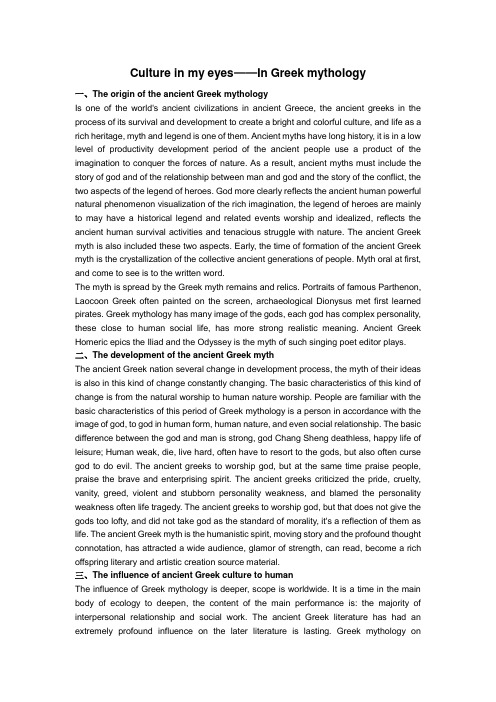
Culture in my eyes——In Greek mythology一、The origin of the ancient Greek mythologyIs one of the world's ancient civilizations in ancient Greece, the ancient greeks in the process of its survival and development to create a bright and colorful culture, and life as a rich heritage, myth and legend is one of them. Ancient myths have long history, it is in a low level of productivity development period of the ancient people use a product of the imagination to conquer the forces of nature. As a result, ancient myths must include the story of god and of the relationship between man and god and the story of the conflict, the two aspects of the legend of heroes. God more clearly reflects the ancient human powerful natural phenomenon visualization of the rich imagination, the legend of heroes are mainly to may have a historical legend and related events worship and idealized, reflects the ancient human survival activities and tenacious struggle with nature. The ancient Greek myth is also included these two aspects. Early, the time of formation of the ancient Greek myth is the crystallization of the collective ancient generations of people. Myth oral at first, and come to see is to the written word.The myth is spread by the Greek myth remains and relics. Portraits of famous Parthenon, Laocoon Greek often painted on the screen, archaeological Dionysus met first learned pirates. Greek mythology has many image of the gods, each god has complex personality, these close to human social life, has more strong realistic meaning. Ancient Greek Homeric epics the Iliad and the Odyssey is the myth of such singing poet editor plays. 二、The development of the ancient Greek mythThe ancient Greek nation several change in development process, the myth of their ideas is also in this kind of change constantly changing. The basic characteristics of this kind of change is from the natural worship to human nature worship. People are familiar with the basic characteristics of this period of Greek mythology is a person in accordance with the image of god, to god in human form, human nature, and even social relationship. The basic difference between the god and man is strong, god Chang Sheng deathless, happy life of leisure; Human weak, die, live hard, often have to resort to the gods, but also often curse god to do evil. The ancient greeks to worship god, but at the same time praise people, praise the brave and enterprising spirit. The ancient greeks criticized the pride, cruelty, vanity, greed, violent and stubborn personality weakness, and blamed the personality weakness often life tragedy. The ancient greeks to worship god, but that does not give the gods too lofty, and did not take god as the standard of morality, it's a reflection of them as life. The ancient Greek myth is the humanistic spirit, moving story and the profound thought connotation, has attracted a wide audience, glamor of strength, can read, become a rich offspring literary and artistic creation source material.三、The influence of ancient Greek culture to humanThe influence of Greek mythology is deeper, scope is worldwide. It is a time in the main body of ecology to deepen, the content of the main performance is: the majority of interpersonal relationship and social work. The ancient Greek literature has had an extremely profound influence on the later literature is lasting. Greek mythology oncomplete, systematic level is very high, is the most complete existing in the world's largest system of mythology. Later generations of philosophers such as Socrates, Plato, Aristotle, historian (Herodotus) materials, which were in Greek mythology often cited artists especially sculpture masters more myth character or plot as the template, create famous in the world, in terms of art, leonardo Da Vinci, Rembrandt, lubumbashi, painting has originated from Greek mythology, the Greek mythology have promoted the development of the humanities spirit research. Ovid's "metamorphoses" Greek mythology is slightly modified retelling, cisse los, ernie uz, Virgil's works are showing signs of being in Greek mythology. Modern humanism thinkers and surprise from Greek mythology found a free, lively, full of original vitality of the world, from the ancient Greek mythology and drama, write a new chapter in history of literature. From the Roman era, the countless literati and the ancient Greek literature as they do not match but tried to climb the peak, the gods in the ancient mythology and epic, the tragic hero in comfort their hearts also inspired their endless. The ancient Greek myth of modern European Renaissance, religious reform movement and the enlightenment had a significant effect. The ancient Greek myth of the people-oriented spirit make people free from traditional constraints.我眼中的文化——希腊神话古希腊神话的起源古代希腊是世界文明古国之一,古希腊人在其生存和发展过程中创建了璀璨多彩的文化,传下丰富的遗产,神话传说就是其中之一。
谈谈古希腊文化中的理性精神的论文

谈谈古希腊文化中的理性精神的论文勿庸质疑,古希腊是欧洲文明的摇篮,正如黑格尔所言:“一提到希腊这个名字,在有教养的欧洲人心中,尤其在我们德国人心中,自然会引起一种家园之感。
; Dl is}但我们知道,在这里所论及的“古希腊”,有其特定的历史范畴和地理范畴。
古希腊文化(包括哲学)的发展,时间上是从公元前6世纪开始的,一直到6世纪初,经过了一千多年之后,它最终把“希腊古典时期,“希腊化时期”和“罗马共和及帝国时期”三个历史时段定格于人类不能抹去的岁月印迹里;从地域上说,古希腊文化始于小亚细亚的希腊殖民城市,在希腊本土上繁荣发展,后流传至亚洲、非洲的广裹大地之上,它被称为“海伦文明”或“爱琴海文明”。
正是它给予了欧洲和全人类坚实的基础,也为人们探究宇宙来源,探索万物真实,并洁问人生目的夯下坚实的基础,也因其内容丰富、气象万千的话语体系,从而为人类的理论思维开掘出一条广阔的道路,给以后的西方文化(包括哲学)的发展奠定了理论基础。
同时,我们也知道:“流传下来的古希腊文化主要是奴隶主的文化。
他们靠奴隶劳动,所以从事文化活动的‘自由’。
古希腊文化起源是很早的。
希腊民族在原始公社和民主社会阶段,就己经有一套丰富而完整的神话。
这是己经通过人民的幻想用一种不自觉的艺术方式加工过的自然和社会形式本身,它‘只不过是希腊艺术的武库,而且是它的土壤’。
古希腊的“奴隶主制”是一种极度残酷的剥削制度,但它的出现是人类社会发展的历史必然,也是历史的进步。
奴隶主之间为了夺取统治权,为了发展生产,总会要求变革,要求认识和掌握自然界的规律。
于是,他们试图对客观的世界作出一种自然性的解释,这就形成了一种或多或少具有自发的辩证法性质的素朴的唯物主义的世界观。
因此,在这“土壤”之七‘希腊艺术的武库”这一浓浓的理性精神得以产生(当然,与这理性精神一同出现的还有宗教精神、人文精神,三者共同组成了古希腊文化的特有形态,它们“有无相生,难易相成,长短相形、高下相倾、音声相合,前后相随”,但鉴于论题本身的界定,这里仅论及它的理想精神)。
- 1、下载文档前请自行甄别文档内容的完整性,平台不提供额外的编辑、内容补充、找答案等附加服务。
- 2、"仅部分预览"的文档,不可在线预览部分如存在完整性等问题,可反馈申请退款(可完整预览的文档不适用该条件!)。
- 3、如文档侵犯您的权益,请联系客服反馈,我们会尽快为您处理(人工客服工作时间:9:00-18:30)。
雅典娜、阿佛洛狄忒、阿尔忒弥斯的分析
姓名:焦敏学号:2013310580341 学院:经济与管理学院
一、摘要
雅典娜、阿佛洛狄忒和阿尔忒弥斯是古希腊神话中的十二主神的三位重要的女神。
她们的诞生、性格、职能各有不同,代表了古希腊的人们对于女性不同的特质的期望,并把这些特质分别赋予了几位女神。
本文将着重分析这三位女神的性格和职能中的矛盾点。
【关键词】雅典娜、阿佛洛狄忒、阿尔忒弥斯
二、女神简介
1.雅典娜
(1)诞生
根据赫西俄德的《神谱》,因该亚和乌剌诺斯有预言说墨提斯所生的儿子会推翻宙斯,宙斯惧怕预言成真,遂将墨提斯整个吞入腹中。
此后宙斯得了严重的头痛症,宙斯只好要求火神赫淮斯托斯打开他的头颅(一说为普罗米修斯),火神那样做了。
令奥林匹斯山诸神惊讶的是:一位体态婀娜、披坚执锐的美丽的女神从裂开的头颅中跳了出来,光彩照人,仪态万方。
(2)外貌
雅典娜有一双著名的明亮大眼睛。
从古希腊雕像看她的面部一般是鹅蛋脸,鼻子挺直,嘴较小常紧抿。
头发有时披着,有时挽髻。
她平时穿自己织的精美裙袍。
作战时戴头盔,上身穿铠甲,右手持矛或胜利女神,左手拿镶着蛇发女妖的盾,肩上有只停着的猫头鹰。
【1】
(3)职能
雅典娜是慧女神与战争女神,同时也是农业女神,并建立了城邦和法典制度。
2.阿佛洛狄忒
(1)诞生
乌兰诺斯的性器被克洛诺斯切下掉入海中,在泡沫中化身成为一位女神,也就是阿佛洛狄忒。
被嫉妒的赫拉许配给丑陋的赫尔斯托斯作为妻子。
身边有着忠实的跟随者丘比特。
(2)外貌
少女阿佛洛狄忒刚刚越出水面,赤裸着身子踩在一只荷叶般的贝壳之上,她身材修长而健美,体态苗条而丰满,姿态婀娜而端庄,一头蓬松浓密的散发与光滑柔润的肢体形成了鲜明的对比,烘托出了肌肉的弹性和悦目的躯体,风神齐菲尔吹着和煦的微风缓缓的把她送到了岸边,粉红、白色的玫瑰花在她的身边飘落,果树之神波摩娜早已为她准备好了红色的新装,碧绿平静的海洋,蔚蓝辽阔的天空渲染了这美好、祥和的气氛,一个美的和创造美的生命诞生了!【2】
(3)职能
爱情女神,向往自由的爱情,不被婚姻所束缚。
3.阿尔忒弥斯
(1)诞生
赫拉和宙斯的女儿,阿波罗的姐姐。
(2)外貌
对宙斯来说雅典娜和阿尔忒弥斯是其最宠爱的两个女儿,但是对于雅典娜和阿尔忒弥斯的感情有所不同也不能相互比较。
雅典娜对宙斯来说是最珍贵的女儿
因为雅典娜的出世是由宙斯头颅中飞跃出来的,对宙斯来说雅典娜就好像他的一块肉,是他的分身,而雅典娜的智慧与力量也使其成为宙斯最看重的女儿。
而阿尔忒弥斯更多的是因为她的美丽而无法不去宠爱,宙斯无法拒绝阿尔忒弥斯提出来的任何请求,阿尔忒弥斯向宙斯索取的神职和终生不嫁的请求,宙斯无不答应。
宙斯曾经答应阿尔忒弥斯在奥林匹斯中月神的地位永远和太阳神平等。
除了宙斯之外,太阳神是诸神中最有发言权的一位,所以月神也是仅次于天后的神职之一,阿尔忒弥斯无疑是宙斯最宠爱的女儿。
【3】
(3)职能
月光女神和狩猎女神,同时也是掌管女性的生命周期,例如例假、生产。
三、雅典娜矛盾点分析
雅典娜是智慧与战争女神,这在古代一般是男性的特质,女性一般是不会被认为是拥有智慧的。
但是偏偏雅典娜是一位女性。
同时她不仅拥有武力,参与了战争,也拥有智慧。
这颠覆了一般我们对于武夫有勇无谋的印象。
雅典娜也帮助人类建立了城邦,教导人们种植农作物。
雅典娜也承担了教导接班人成长为合格的接班人、维护城邦的任务。
雅典娜安排奥德修斯之子特勒马科斯去打探父亲的消息。
其实雅典娜本身就可以保证奥德修斯的安全,但是她还是派特勒马科斯去了。
这是因为雅典娜的用意在于训练特勒马科斯的能力,使其成长为一个合格的贵族接班人。
雅典娜本身是女性,但是她也是处女神。
她坚定地维护自己的贞洁,反对一夫一妻制的婚姻,这与阿尔忒弥斯相同。
或许正因为她不算是完整的女性,不曾生育或者成为男性的妻子,她才能够上战场,与男人并肩作战,在男权世界主导的神谱中成为仅次于宙斯的女神。
她身为女神,却是男权世界的维护者。
她作为宙斯的长女,维护宙斯的统治,这也象征了男权社会男性至高的地位。
四、阿佛洛狄忒矛盾点分析
阿佛洛狄忒是爱情女神,拥有致命的诱惑力和美貌。
或许是因为诞生于乌兰诺斯的性器,阿佛洛狄忒总是与性爱联系在一起。
因此她也被看作是妓女的守护神。
她虽然美貌,却被嫉妒的赫拉许配给最丑陋的神赫尔斯托斯作为妻子。
向往自由恋爱的阿佛洛狄忒并不忠于自己的丈夫,她同时与多个其他的神灵有染。
并且,她虽然为女性,也并不具备母性(本文分析的三位女神都不具备这一特点)。
或许这也说明了女性魅力与母性是不可同时存在的。
古希腊神话对于男性是没有出轨、不忠、处男这一说法的,只对女性有。
这也反映了古希腊男人和女人地位的不平等。
五、阿尔忒弥斯矛盾点分析
阿尔忒弥斯向父亲宙斯索要了弓箭和贞洁,从此躲入山林。
与雅典娜相反,雅典娜入世,参与人类的战事,而她远离人群,与飞禽走兽为伴。
阿尔忒弥斯虽然自己是处女神,象征着纯洁。
但是她同时掌管着女性的生命周期,例如月经、分娩。
月经代表着女性从少女走向成熟的女人,可以成为男性的妻子。
孕育生命。
分娩则是进行新生命的繁衍,是只有女人具有,而男人不具有的功能。
在原始的母系社会,这曾是男人对于女性的崇拜的根源。
阿尔忒弥斯是狩猎之神,某种意义上她带来了死亡。
但是她也与人类的生命繁衍有关。
死亡与出生,构成了有趣的反差。
六、总结
古希腊人将对女性的各种美好特质赋予不同的女神,但是这些女神并不是完美的。
她们性格各异,优缺点共存。
不同于中国对于各种神仙佛祖的描述,在中国传统文化中,只有德行高尚才能冠以神、圣人等等称呼。
在古希腊文化中,雅典娜不具备女性的柔美、嗜杀血腥。
阿佛洛狄忒虽然美貌却淫荡,具有女性魅力却不具备母性。
阿尔忒弥斯死亡与生命的矛盾。
还有本文许多没有分析到的神,他们都或多或少的有自己的优缺点。
所以我们在看待这些古希腊神话传说的时候,要辩证的看到。
了解人物的全部,更有助于我们了解古希腊文化。
七、参考文献
唐晨曦. 论希腊神话中的雅典娜[D]. 上海师范大学, 2010.
孙师. 古希腊奥林波斯女神崇拜浅探[D]. 湖北大学, 。
2014.
王洋洋. 论古希腊神话中、的阿芙洛狄忒女神[D]. 辽宁大学, 2015.
陈红. 论古希腊女性意识的缺乏-------------以古希腊神话传说中的女性形象分析[J]. 学术论文全文数据库.
刘霞. 希腊女神知多少[J]. 中学生英语:高中版, 2006(26).。
